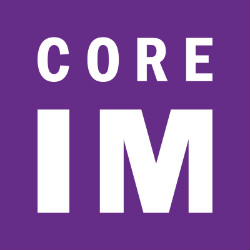Core IM
Despite ongoing research into best practices for managing pulmonary emboli, there remain gaps in the literature and there are patients whose clinical scenario are not described by the existing studies. In this episode of Core IM, the team will discuss this scenario and others to offer a better understanding of Grey Matters: Bleeding vs. Clotting Risks.
First, listen to the podcast. After listening, ACP members can take the CME/MOC quiz for free.
CME/MOC:
Up to 0.5
AMA PRA Category 1 Credits ™ and MOC Points
Expires February 23, 2025
expires-soon
Cost:
Free to Members
Format:
Podcasts and Audio Content
Product:
Core IM
Welcome to Core IM, a virtual medical community! Core IM strives to empower its colleagues of all levels and backgrounds with clinically applicable information as well as inspire curiosity and critical thinking. Core IM promotes its mission through podcasts and other multimodal dialogues. ACP has teamed up with Core IM to offer continuing medical education, available exclusively to ACP members by completing the CME/MOC quiz.

- Intro
- Case Introduction
- Deep DiveClinical Dilemma #1 - How long should I anticoagulate for a PE before doing a time-sensitive liver biopsy?
- For patients with proximal DVT, the risk of having a recurrence or progression of the DVT or PE without anticoagulation in the first 30 days is about 50% from a 1979 NEJM trial
- Within the first month of being on anticoagulation for DVT you get fibrinolysis and endothelialization so theoretically after 1 month there should be decreased risk of embolization
- A 1995 NEJM trial showed that there was decreased VTE recurrence with 6 months as opposed to 6 weeks of anticoagulation
- Deep DiveClinical Dilemma #2 - The patient returns with progression of her PE after only 3 days off of anticoagulation. What went wrong here?
- The PAUSE trial looked at holding DOACs prior to surgery in patients with AF and showed that holding the DOAC for 48h was associated with low stroke and low bleeding risk, but that’s all the data that we have for holding DOACs periop that we’re aware of
- In the trial of apixaban vs low molecular weight heparin (need to find this trial) for cancer associated thrombosis 0.7% of the patients on apixaban had a recurrent clot in the first 6 months while they were still on the drug. And it was even higher for low molecular weight heparin.
- Deep DiveClinical Dilemma #3 - Should we place an IVC filter to prevent further embolization of her DVT
- The PREPIC1 trial compared anticoagulation alone to anticoagulation plus IVC filter and showed no difference in mortality
- The PREPIC2 trial also compared anticoagulation alone to anticoagulation plus IVC filter but looked symptomatic PE and there was also no difference
- Both trials found an increased rate of DVT in the IVC filter group
- Deep DiveClinical Dilemma #4- When should we do a liver biopsy in a patient with an active clot who has failed outpatient interruption of anticoagulation?
- There are interventional radiology consensus guidelines that are used to estimate patient bleeding risk and procedure bleeding risk to decide what best to do with a patient’s anticoagulation
- Case Conclusion and Reflections
Contributors
Brett Carroll, MD* - Guest
Jason Freed, MD - Host, Editor
Alison Pishko, MD* - Guest
Alison Trainor, MD - Host, Editor, CME Question
Shreya Trivedi, MD, ACP Member - Editor
Jeff Weinstein, MD - Guest
Reviewers
Michael S. Shen, MD, ACP Member
Sean Burke, MD, ACP Member
Dr. Brett Carroll reports a research grant/contract with Bristol Myers Squibb and is a consultant for Janssen and Reliant Medical. Dr. Alison Pishko reports a research grant/ contract with Sanofi Genzyme.
Those named above, unless otherwise indicated, have relevant financial relationship(s) with ineligible companies whose primary business is producing, marketing, selling, re-selling, or distributing healthcare products used by or on patients. All relevant relationships have been mitigated.
Release Date: February 23, 2022
Expiration Date: February 22, 2025
CME Credit
This activity has been planned and implemented in accordance with the accreditation requirements and policies of the Accreditation Council for Continuing Medical Education (ACCME) through the joint providership of the American College of Physicians (ACP) and Core IM. The American College of Physicians is accredited by the ACCME to provide continuing medical education for physicians.
The ACP designates this enduring material for .5 AMA PRA Category 1 credit TM. Physicians should claim only the credit commensurate with the extent of their participation in the activity.
ABIM Maintenance of Certification (MOC) Points
Successful completion of this CME activity, which includes participation in the evaluation component, enables the participant to earn up to .5 medical knowledge MOC Point in the American Board of Internal Medicine’s (ABIM) Maintenance of Certification (MOC) program. Participants will earn MOC points equivalent to the amount of CME credits claimed for the activity. It is the CME activity provider’s responsibility to submit participant completion information to ACCME for the purpose of granting ABIM MOC credit.
How to Claim CME Credit and MOC Points
After listening to the podcast, complete a brief multiple-choice question quiz. To claim CME credit and MOC points you must achieve a minimum passing score of 66%. You may take the quiz multiple times to achieve a passing score.


